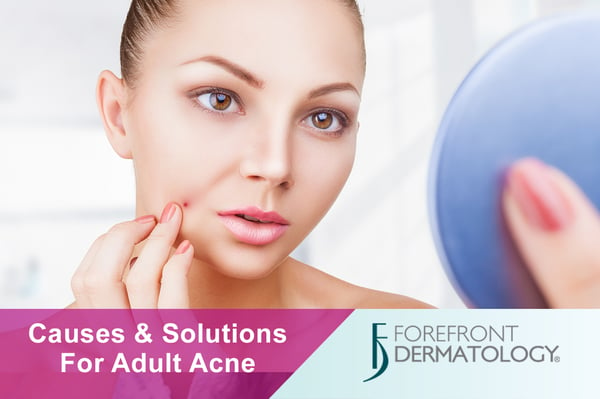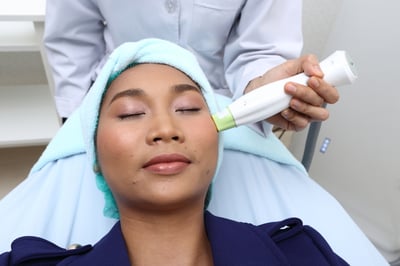
If you find that pimples are popping up in your adult years, you are not alone! While we typically think of acne as a problem associated with our teenage years, adult acne is a common problem that often goes diagnosed.
If your acne is impacting your well-being and self-esteem, your feelings should not be dismissed. When you contact your local, board-certified dermatologist, you will be treated with the same compassion as anyone else with a chronic health condition, and we will work with you to get to the bottom of what is causing your acne.
Facts About Adult Acne
- Acne is the most common skin condition in the United States, affecting up to 50 million Americans annually
- Women are more likely to suffer from acne than men and this seems to be related to hormones
- Men are more likely to suffer acne scarring than women
- It’s a myth that acne results from poor hygiene
Potential Causes of Adult Acne
There are many contributing factors that lead to acne flare-ups which include the following:
- Hormones Leading to Excess Oil Secretion, Bacteria and the Clogging of Pores
Androgens, the male hormones present in both men and women, can contribute to acne flares by overstimulating the oil glands and altering the development of skin cells that line hair follicles in the skin. - Overproduction of a Skin Oil Called Sebum
Too much production of a skin oil called sebum, presence of bacteria, and the clogging of skin pores (follicles) with debris are the most common known causes of acne. - Makeup
Makeup can trap dirt under the skin and trap oil and bacteria in your pores. If you are going to use makeup, select products that are oil-free and non-comedogenic. In addition, when you apply or remove makeup, you are transferring dirt and oil from your hands to your face. When you apply makeup, be sure to thoroughly remove it at night with a gentle face cleanser to fully remove anything that may be clogging your pores. - Genetics
Patients that have severe acne often report that their parents had similar problems with acne. We do know that genetic predisposition is a factor in adult acne. - Stress
Because stress is a part of our daily lives, it can be nearly impossible to avoid, but oftentimes our skin can be a reflection of our overall health and stress can be a trigger for acne in those who are already prone to breakouts. Unfortunately, having acne itself can lead to stress and depression. If you are experiencing stress related to your skin, there are many treatment options that can help. - Diet
Today, some researchers believe that there is indeed a connection between food and acne. Some of the culprits that have been linked to acne are sugary foods, dairy products, and unhealthy fats. Conversely, omega-3 fatty acids found in fish may help reduce acne severity.
Potential Solutions for Adult Acne
- See Your Dermatologist and Develop a Treatment Plan
There are a number of possible treatments for adult acne, from topical treatments to various pill therapies, depending on the type of acne you have and the severity of your condition. According to Rachel Ade Koziczkowski, a board-certified dermatologist with Forefront Dermatology in Moline, Illinois, “I like to sit down with my patients to gain a thorough understanding of how their acne is impacting their lives. In addition, determining what type of acne they are dealing with helps me to collaborate with them to determine the most appropriate treatment plan. Providing adherence strategies for patients is something I focus on at each visit. It is so rewarding for me to see my adult acne patients come back with clear and beautiful skin a few months down the road, because the glow goes way beyond their faces.” - Develop a Skincare Regimen That Is Designed Specifically for You
While it may be tempting as an adult to walk up to your nearest cosmetics counter and spend big money on skincare products, you will have much more success working with your local board-certified dermatologist or licensed esthetician to design a skincare regimen designed to treat your specific skincare issues. - Don’t Touch Your Face or Pop Pimples
Your hands are a constant source of dirt, bacteria, and oil, and when you touch your face, these elements are transferred to your skin and can cause acne. If you have a large pimple and an important event to attend, see your dermatologist for an injection that can reduce its size and appearance. Be sure to thoroughly cleanse your hands with soap when you do need to touch your face. As tempting as it can be, do not try to pop pimples. This can spread acne bacteria to the rest of your face and spread acne-causing bacteria, and also lead to scarring. - Avoid Stress and Get Exercise
If you are struggling with acne, try to literally not “sweat” the small stuff. Stress has been proven to increase breakouts, so try to find natural ways to decrease stress through meditation, adequate sleep, and exercise. Just be sure to thoroughly shower and cleanse skin after exercising and sweating. - Eat Healthy
Many skin care experts agree that eating certain foods and avoiding others can significantly improve your skin. Enjoy a diet free of excess sugar and dairy, while adding healthy foods to your diet such as foods rich in omega-3 fatty acids and healthy greens, like kale and salmon.
Are You Struggling With Adult Acne: How Can We Help?
If you are or a family member is struggling with acne or a skin concern, find the Forefront dermatologist nearest you to schedule an appointment or to learn more.





